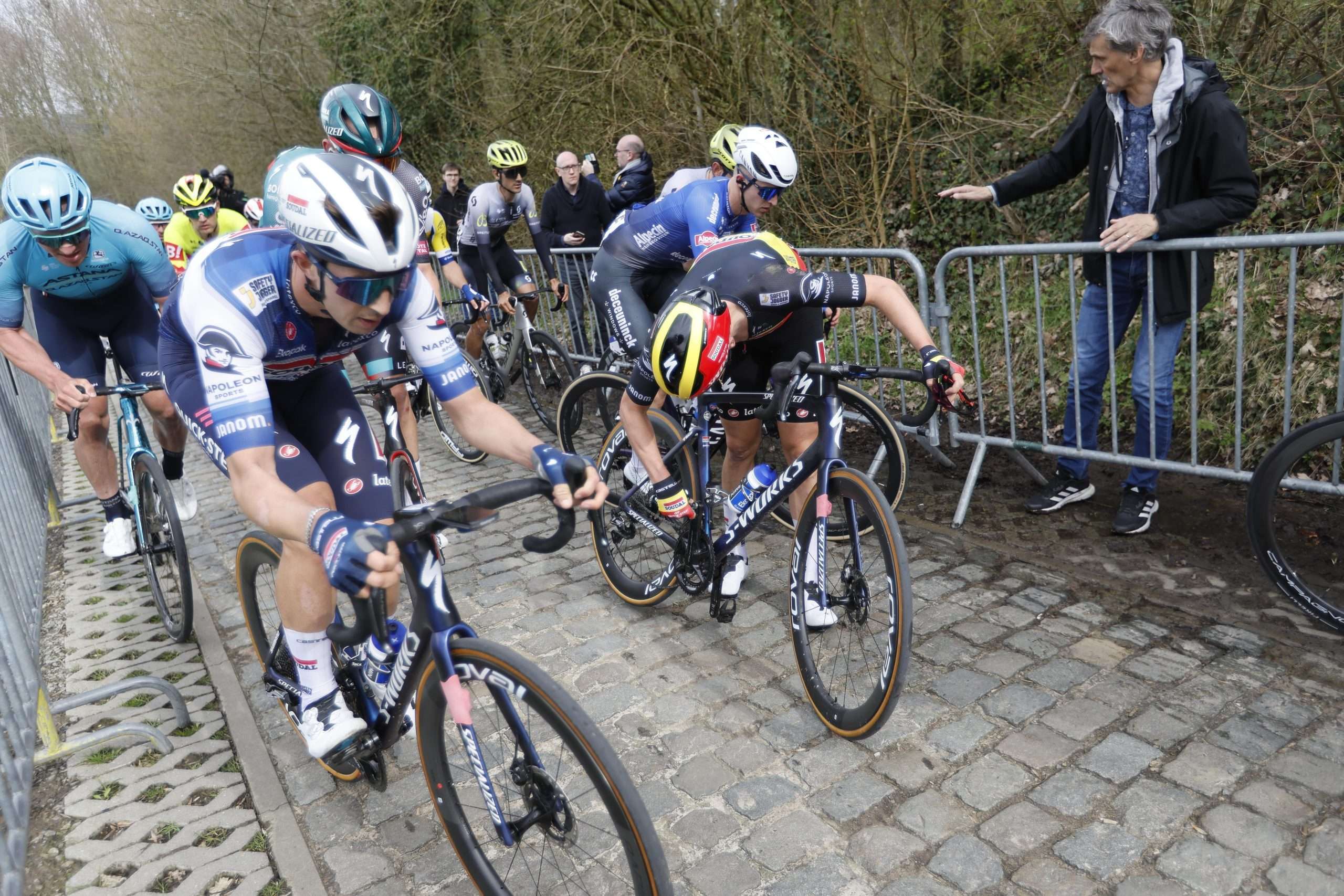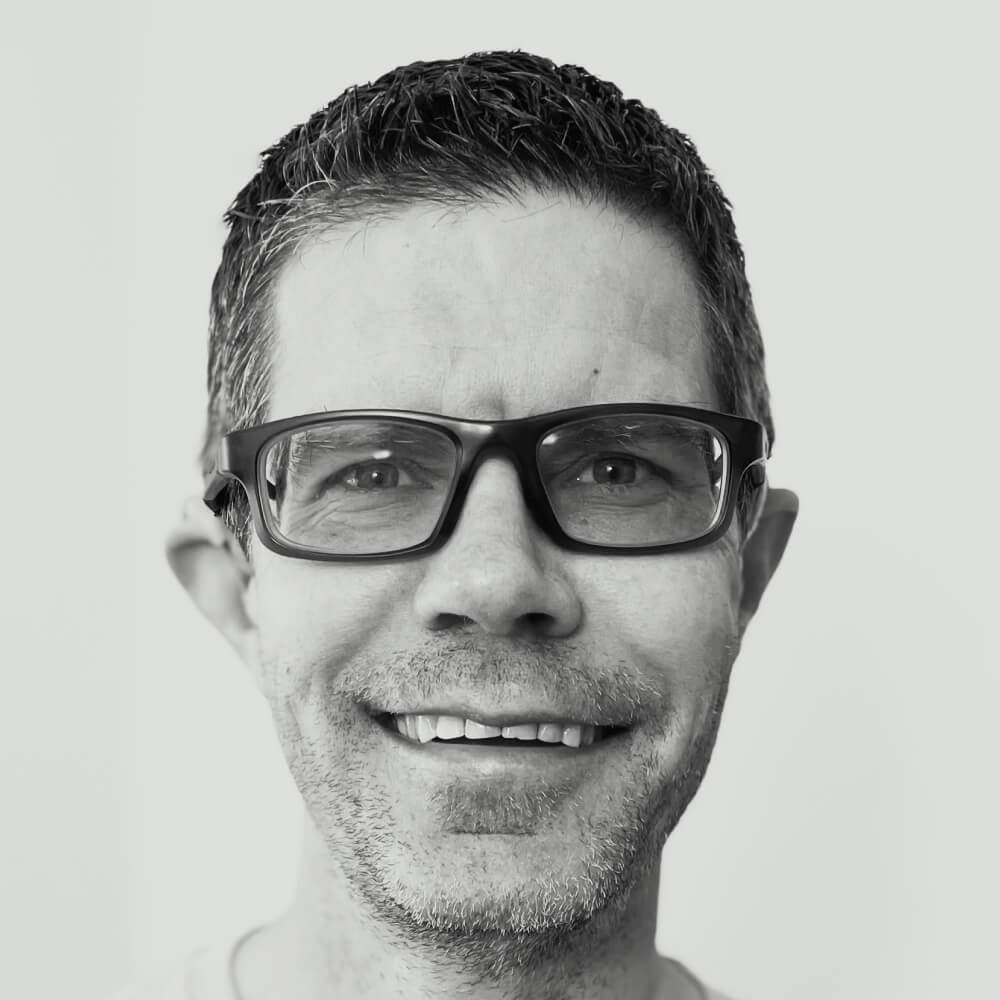We hope that Patrick Lefevere has many tasty Michelin-starred lunches to look forward to.
That may be about all there is for him to savor from the cobbled Classics the next year or so, which undoubtedly leaves a sour taste for Lefevere and his Soudal Quick-Step team’s legions of fans, for whom a win at Paris-Roubaix or the Tour of Flanders is worth more than any other.
Barring the team uncorking a Jeroboam-sized bottle of whoop-ass on the peloton this Sunday or next, 2023 will mark the second year in a row that Lefevere’s storied team failed to take home a victory in a WorldTour-ranked cobbles race. Worse, it will make three of the last four; the 2021 season, with wins in Het Nieuwsblad, E3 Prijs, and Flanders now looks like the outlier in recent years. In fact, through Dwars door Vlaanderen, Soudal is currently being outpointed in cobbled WorldTour-level races by Movistar, whose second-place finish in Dwars by Oier Lazkano outranks Yves Lampaert’s third at Brugge-De Panne as the best result for either team.
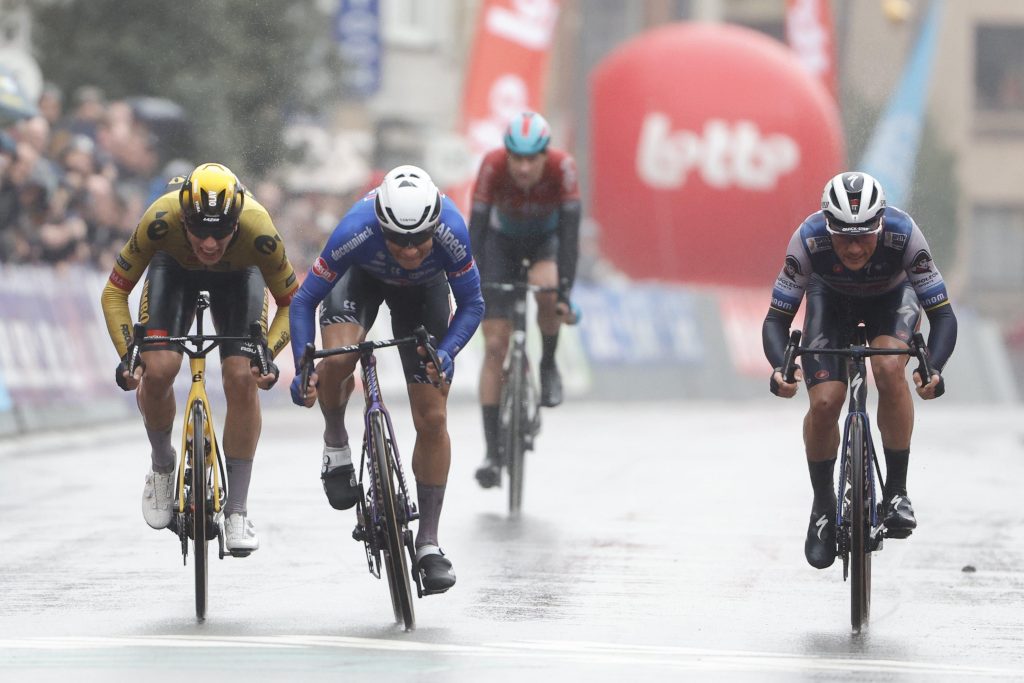
That’s not to say that the outfit is in a dry streak like its disastrous 2011 season. It’s won 18 races on three continents so far this year, on courses as varied as wide-road sprints at the UAE Tour, Nokere Koerse (cobbles, just not WorldTour ones), and uphill finishes at the Volta Catalunya. Nine different riders – plus the whole team, in UAE’s TTT stage – have stood on top of the podium so far this season already. But look closer: some of the team’s biggest successes have come courtesy of one rider, Remco Evenepoel, and in a discipline that the team has never really targeted with full gusto: stage racing.
That’s right: The vaunted Wolfpack, which in the team’s two-decade existence has won eight Tours of Flanders, six Paris-Roubaix, eight E3s, four Het Nieuwsblads, and three Gent-Wevelgems, is a Grand Tours team. If you made that prop bet four years ago, congrats friend, and please send your Flanders trifecta pick.
What explains the Pack’s precipitous fall from the crown of cobbled royalty into the relatively smooth-paved gutter? There are three macro factors at work.
Lefereve’s constant dash for cash
I mean, it’s always money, right? But specifically, it’s about pro cycling’s dysfunctional business model that consigns teams to depending almost entirely on the largesse of a marketing sponsor to survive (imagine the Dallas Cowboys folding because AT&T pulled its name off the stadium, or Arsenal going under because Emirates no longer wanted to be on its jersey).
Lefevere has been more successful than many; in its 20th season, his team has been through four major sponsor turnovers, with the enduring mainstay being the Quick-Step flooring company. Whether he’s blustering or not, Lefevere has several times over the years intimated that the team is just one major-sponsor departure away from stopping. And while team budgets are – a couple of notable exceptions aside – not public, Lefevere’s outfit has never been reported as one of the wealthiest in the sport; in every estimate I’ve seen of team budgets, they’re closer to the median than the galacticos like Ineos, UAE, and Jumbo-Visma.
Soudal Quick-Step has endured a couple of relative cobble dry spells before (not to be confused with dry-cobble spells, which is when it doesn’t rain for Flanders and Roubaix), in 2010-2011 and 2015-2016. Notably, these both coincided with flux in the title sponsorship. The result: when things get tight, Lefevere is under the same pressure as any other team to find and keep talent, and with that comes the expected dips in performance.
Wout stole all the free agents
The past four years have also seen the rise of two generational talents in the sport, both of whom happen to excel at Classics racing, although not only that. Mathieu van der Poel has already won two Tours of Flanders and two Dwars door Vlaanderens. Wout van Aert is still searching for that elusive first cobbles Monument, but does have two wins in E3 Prijs, a Het Nieuwsblad victory, and one Gent-Wevelgem title. A third generational talent, Tadej Pogačar, is primarily a stage racer but is not so bad at cobbles himself.
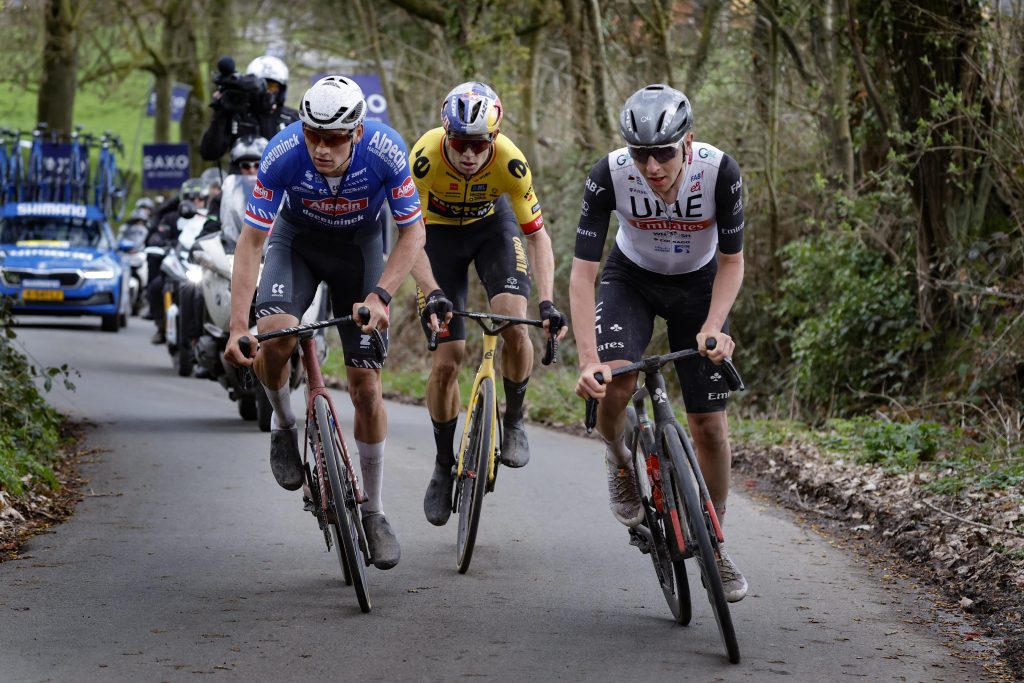
But the Wout-and-Mathieu effect goes well past their own results. Both are tightly tied to their respective teams, where they’ve found both top-level support and the freedom to create their own schedules, including in other disciplines like Van der Poel’s World Cup mountain bike campaigns. And their steady presence at Alpecin-Deceuninck (Van der Poel) and Jumbo-Visma (Van Aert), has fundamentally reshaped the balance of power in cobbles racing by attracting like-minded riders.
Alpecin has nurtured the careers of riders like Jasper Philipsen and Tim Merlier, and the Roodhooft brothers have helped fill the hole left by Merlier’s departure to Soudal with some savvy signings like Søren Kragh Andersen, Kaden Groves, and Quinten Hermans. But the transformation at Jumbo has been truly remarkable.
When Van Aert first joined the team in 2019, Jumbo had a moderately serviceable lineup of support riders for the Classics: sturdy workers like Mike Teunissen and Taco van der Hoorn, but not feared threats. But last year, the team upgraded massively, with Tiesj Benoot and Christophe Laporte, before adding Roubaix winner Dylan van Baarle for 2023. And don’t look now, but 2021 signee Nathan van Hooydonck is quietly having a solid season himself, while young sprinter Olav Kooij is showing signs of being a cobbles threat.
That’s the lineup of hitters Lefevere’s teams used to boast through much of the 2010s, when Tom Boonen was backed up by Niki Terpstra, Lampaert, and Zdenēk Štybar, among others.
The result is Jumbo has dominated the 2023 cobbles season like those Quick-Step teams often did, with wins in four of the five WorldTour events so far, plus Kuurne-Bruxelles-Kuurne, by four different riders. The only one they didn’t win, Brugge-De Panne, went to Alpecin’s Philipsen, who narrowly beat out Jumbo’s Kooij with Lampaert in third.
Julian and Remco got paid
Lefevere has had plenty of stars come and go during his time as general manager. But of late, many of the team’s biggest successes have come from two riders: Julian Alaphilippe and Evenepoel.
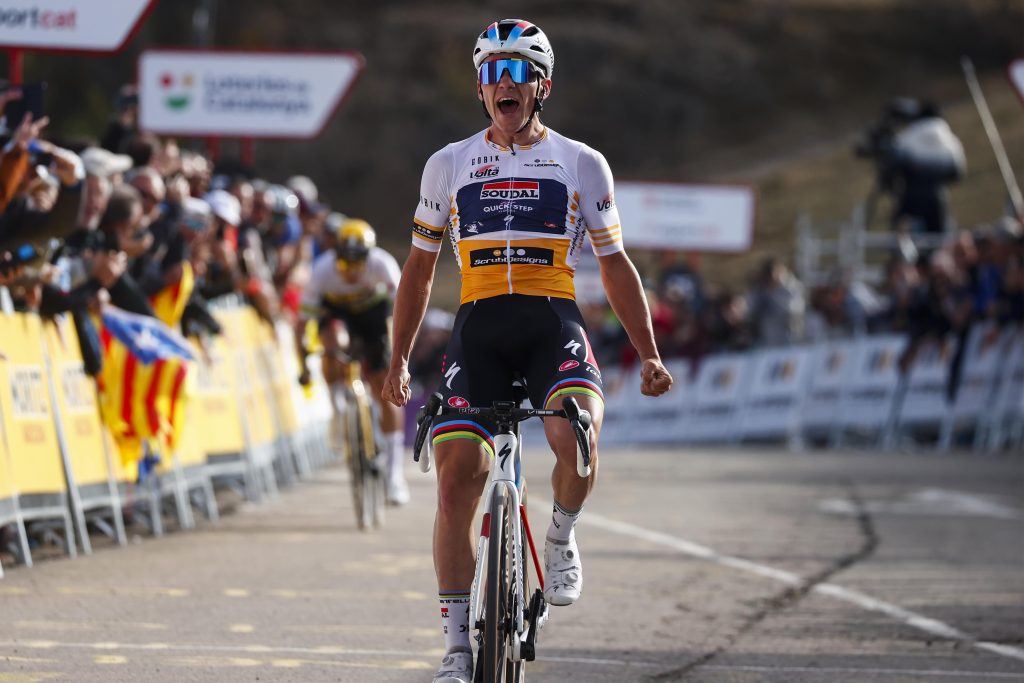
Alaphilippe has, remarkably, ridden his entire 10-year pro career under the Quick-Step flag. And he’s gotten more expensive with every successive contract renegotiation. His last renewal, in April 2021, came off the back of two of his most successful seasons: the 2019 campaign where he won two Tour de France stages and wore yellow for two full weeks, and the pandemic-shortened 2020 campaign that saw him back in yellow (just three days this time) and the first of his world road titles. He signed a three-year extension, through 2024.
Salary data, like team budgets, aren’t public, but a 2022 story by Calcio e Finanza estimated Alaphilippe was making comfortably in excess of €2 million per year. Lefevere, never shy about criticism, has remarked a number of times over the last year or so that Alaphilippe is paid handsomely and needs to live up to his contract.
Then there’s Remco. One of the most highly sought-after espoirs, he signed a four-year contract with Quick-Step in 2019, an unusually long term in a sport characterized by one- and two-year deals. But in 2021, he inked a five-year extension that keeps him in the fold through 2026. In retrospect, Evenepoel might have left money on the table, as his 2022 season saw him win the Clasica San Sebastian, the Vuelta a España, and the World Championship road race.
Or maybe he didn’t leave money on the table. Evenepoel had barely pulled on his rainbow jersey than rumors linked him to Ineos and there was talk of unpaid bonuses. Lefevere eventually admitted that Patrick Evenepoel, Remco’s father and agent, “played an open hand,” but after some scrambling that seemed to support the notion that the offseason is the silly season, Lefevere posted a photo on Instagram of him clinking glasses with both Evenepoels – at the Michelin-starred Sir Kwinten restaurant, naturally – to tamp down the speculation. The only thing we don’t know is whether there was a significant corkage fee on that bottle of wine, in the form of a bump-up in Evenepoel’s paycheck.
In any case, you can figure that between Alaphilippe and Evenepoel, Lefevere is probably spending at least 25% – and likely more – of his total rider salary pool on two guys. That is an absolute gravity well for free cash flow on any team, and certainly one without Jumbo-deep coffers. And more to the point, it means the other 27 riders have to split the rest.
The result: more lovely, sad, and winless lunches
Lefevere’s financial realities, combined with both the rise of cobbles superstars on other teams and his own outfit’s changing talent base, has shifted Soudal Quick-Step’s own emphasis. The Classics core of the team is talented and still dangerous, but aging quickly. Once-promising threats like Florian Sénéchal and Lampaert are now 29 and 31, respectively. Even Kasper Asgreen is now 28 and seemingly well off the form of his standout 2021 season. (The lack of a successor to Boonen may, more than anything, underscore how rare riders of his talent are: when he retired in 2017 he took with him half the victories Quick-Step has ever had in cobbled WorldTour races.)
Merlier, one of just three incoming transfers last offseason, has been the team’s most consistent rider on cobbles, but crashed out of Dwars and isn’t on the Flanders startlist. Adding sprinter Fabio Jakobsen to the Gent roster, an admitted desperation move by Lefevere, led to a brief chasse patate and then a DNF. Even broad-shouldered Tim Declercq seems to be spending far less time shattering the rest of the pack with his pacemaking these days.
Maybe the addition of Alaphilippe at Flanders will punch up some much-needed panache. (There are even scattered mutterings of Remco riding to the rescue.) But so far this season on the cobbles, at least, the team seems lost, missing breakaways, and racing with a reactive approach that’s far from its usual aggressive swagger.
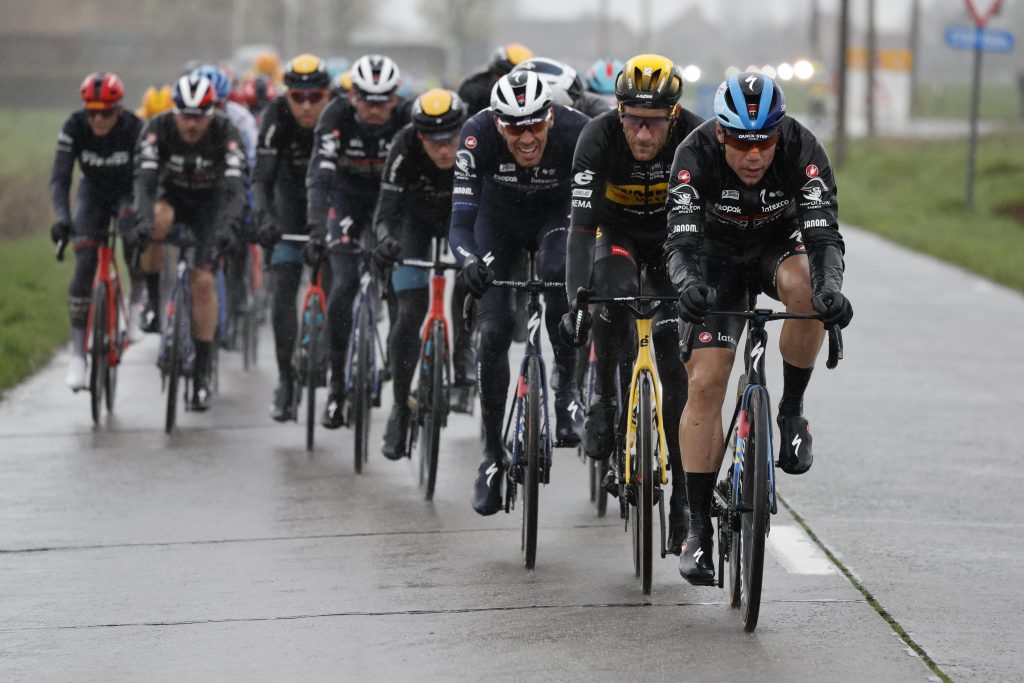
Meanwhile, Evenepoel is going toe-to-toe with Primož Roglič at Catalunya and some of the team’s most promising young talents – Andrea Bagioli, Mauro Schmid, and Ilan Van Wilder – are climbers and stage-racers themselves. All three are also free agents this offseason; they or their replacements will be essential to Evenepoel’s success, and that won’t come cheap.
Quick-Step has had some very good stage racers before: riders like Enric Mas and João Almeida. But the team never seemed to go all-in on a Grand Tour campaign like it has with Evenepoel and, obviously, that investment has paid off. And so the balance of power has shifted.
But it’s also clear that, while stage racing may attract sponsors to pay the bills (at least as long as the team’s face is Belgian), it’s not where Lefevere’s heart is. It’s worth noting that the same day Evenepoel was fighting to the last meter at Catalunya, where he won two stages and finished a close second overall to Roglič, Lefevere was lunching at E3, where Lampaert was the lone Soudal rider in the top 25 and well behind the heart of the action.
All of which is to say: the Wolfpack may not be a cobbles team now, but that’s probably a temporary condition. Things change, after all, and on Tuesday a possible opening appeared with the news that Jumbo is facing a title sponsor search of its own after the 2024 season. Maybe Van der Poel decides he wants another crack at the Olympic mountain bike title next year. And time doesn’t wait for even generational talents: at the end of that season, both Van Aert and Van der Poel will be 30 and almost 30, and Jumbo’s all-star support roster of Benoot, Laporte, and Van Baarle even older.
That’s when I’d expect Soudal Quick-Step to rise again. The oldest wolf of all is Lefevere, and he knows a thing or two about surviving through lean times. The pack will hunt again.
What did you think of this story?
